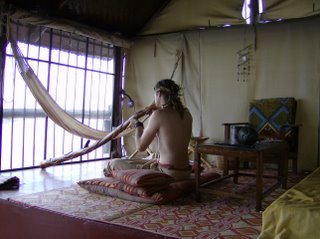She stopped loving me
a shot rang out
I couldn’t care
Then I stopped loving her
Saturday, December 16, 2006
Friday, December 08, 2006
Wednesday, November 22, 2006
Monday, October 23, 2006
SHALLOW
I'm digging a shallow grave
not for me
I'm ready to die for you
but you have already died for me
I wonder why you smile
while I look the other way
Maybe its the reflection in your teeth
Or my living tradgedy
That you should bring me life
and I all that is empty
The grave is ready to be filled
lie peacefully
I'm digging a shallow grave
not for me
I'm ready to die for you
but you have already died for me
I wonder why you smile
while I look the other way
Maybe its the reflection in your teeth
Or my living tradgedy
That you should bring me life
and I all that is empty
The grave is ready to be filled
lie peacefully
Friday, October 20, 2006
I WONDER
I wonder when
you'll stop calling me love?
Or sweet like a sugar cane
when we meet
I wonder when
you'll stop remembering my name?
Calling out out night
or whispering in a dream
I wonder when
you'll stop seeing my face?
Laughing and crying
in dawn and dusk light
I wonder when
you will stop loving me?
Because I still see you
and you still see me
I wonder, in this life or the next?
I wonder when
you'll stop calling me love?
Or sweet like a sugar cane
when we meet
I wonder when
you'll stop remembering my name?
Calling out out night
or whispering in a dream
I wonder when
you'll stop seeing my face?
Laughing and crying
in dawn and dusk light
I wonder when
you will stop loving me?
Because I still see you
and you still see me
I wonder, in this life or the next?
Wednesday, September 13, 2006
Tuesday, September 12, 2006
EVENING PRAYER
I know you see me
late at night in dreams you have
nightmares for the morning light
lost to the love of your life
Waking is spent trying to remember
that deep love of solitude
found in the company of others
but not me
Until night creeps in
and I lie awake late
and cling to threads of light
that all your dreams may come true
I know you see me
late at night in dreams you have
nightmares for the morning light
lost to the love of your life
Waking is spent trying to remember
that deep love of solitude
found in the company of others
but not me
Until night creeps in
and I lie awake late
and cling to threads of light
that all your dreams may come true
Monday, August 21, 2006
HUNGRY
We’ve fed these hungry mouths
Every morning, every evening
And there is so many more to feed
With words of a lightening flash
Once hear and now gone
I often wonder what it is like
To be fed only to be hungry again
For more
These hungry mouths give me life
Through their smiles and words
They feed my soul
And all therein
Thursday, August 10, 2006
Tuesday, August 08, 2006
At two twenty on Saturday the 5th of August my good friends Scotty and Gab had their second child, a little baby girl. CONGRATULATIONS!!! This is my poem from me to her:
A baby is born
in the likeness
of none before
A life is here
I can feel it
from there to here
A life to love
and be loved
To be, to be
Go now
go into the world
Go with love and peace
from me to you!
A baby is born
in the likeness
of none before
A life is here
I can feel it
from there to here
A life to love
and be loved
To be, to be
Go now
go into the world
Go with love and peace
from me to you!
Friday, August 04, 2006
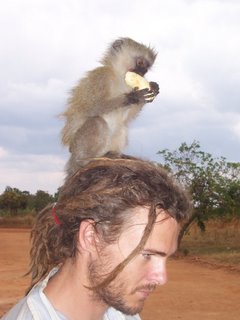
VEGAN?
The term philosophy is often used to mean a set of basic values and attitudes toward life, nature and society. In this sense, Veganism is a "Philosophy of Life," guided by an essential core of values and principles:
•
Vegans see life as a phenomenon to be treasured, revered and respected. We do not see animals as either "The Enemy" to be subdued, or the Materials for Food, Fabric or Fun that were put on Earth for human use.
•
Vegans see themselves as a part of the natural world, rather than its owners or its masters.
•
Veganism recognizes no expendable or superfluous species that humans are free to hurt or destroy. Species of life-forms need not justify their existence, nor plead for protection from extinction on the grounds of their potential usefulness as food or medicine for humans. We continue to be burdened and misguided by adages such as "A weed is a plant we have not yet found a use for."
•
Veganism acknowledges the intrinsic legitimacy of all life. It rejects any hierarchy of acceptable suffering among sentient creatures. It is no more acceptable to torment or kill creatures with "primitive nervous systems" than those with "highly developed nervous systems." The value of life to its possessor is the same, whether it be the life of a clam, a crayfish, a carp, a cow, a chicken, or a child.
•
Veganism understands that gentleness cannot be a product of violence, harmony cannot be a product of strife, and peace cannot be a product of contention and conflict.
•
Vegan ideals encompass much more than advocacy of a diet free of animal products, or a fervent defense of animal rights. Veganism excludes no sentient being–animal or human– from its commitment to compassionate, gentle benevolence. To show tender regard for the suffering of animals, yet treat humans with callous contempt, is a disheartening contradiction of Vegan principles.
•
John Muir, talking about the natural environment, once observed "Every time I bend down to pick something up, I find it is connected to something else." There is an equivalent "ecology" to our behavior. Everything we do connects to something else; every action touches on the world around us, either close at hand and noticeable, or far away and unperceived, immediate in its effect or distant in time.
•
If Veganism has a prime value, it is simply that life-respecting compassion overrides individual issues of custom, convenience, comfort or cuisine.
•
If there is a single article of faith, it is that commitment to Vegan values will bring us closer to a world in which the fate and fortune of a planet and all its life forms do not hang on the judgment or the generosity of one species.
•
If there is one single concept that both generates and sustains the meaning and the power of the Vegan world-view, it is found in the word mindfulness. As Vegans, we strive to be thoughtful, aware and concerned about the impact of our choices, our actions and our decisions. The fruit of this awareness is inner peace, the quiet strength of ethical confidence, and an uplifting sense of fulfillment
Thursday, August 03, 2006
SURVIVAL
If I took all this pain
Inside me
And gave it to you
What would happen?
Would time stand still?
Would your head spin?
And fall to the floor
Like all the prisoners here before?
Caged and enslaved
To the mere thought
Cement and bars around my heart
To be free or die trying
Is better than giving all this pain
To you
If I took all this pain
Inside me
And gave it to you
What would happen?
Would time stand still?
Would your head spin?
And fall to the floor
Like all the prisoners here before?
Caged and enslaved
To the mere thought
Cement and bars around my heart
To be free or die trying
Is better than giving all this pain
To you
Wednesday, August 02, 2006
DESTINY
I may be a some kind of a freak
but I am human just like you
Flesh and blood, bones and hair
windows for eyes so I can see you
Our words may be different
but what I mean to tell you
I've got many feelings
like nerve endings, all of them new
Yes I am some kind of a freak
but through my windows I see you
Playing and laughing in my garden
picking flowers and petals
One for each day I am without you
I may be a some kind of a freak
but I am human just like you
Flesh and blood, bones and hair
windows for eyes so I can see you
Our words may be different
but what I mean to tell you
I've got many feelings
like nerve endings, all of them new
Yes I am some kind of a freak
but through my windows I see you
Playing and laughing in my garden
picking flowers and petals
One for each day I am without you
Monday, July 31, 2006
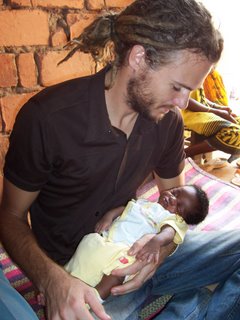
- MAP -
Men Against Patriarchy
This document is a manifesto for men to join together to find a way out of the bonds of patriarchy. The idea for forming MAP is based on the realization that patriarchy is just as damaging to the male spirit as it is to the female one. MAP is further based on the realization that the prevailing global systems of patriarchy together with capitalism and liberalization are causing deep harm to all living and non-living entities within this planet earth. Many women woke up to this realization years ago, as they were (and still are) the most directly affected by these oppressive forces. Many men on the other hand live in a state of denial, that somehow through their position within patriarchy their lives will be fully enriched. The truth is that the majority of men are in a terrible state under this system. This can be seen in the amount of violence men cause to other men, to women and to fellow beings. This can be seen in the bitterness and the disconnection of men to their emotions. This can be seen in the total lack of social support for men in their attempt to change themselves and their circumstances. This can be seen in the high suicide rates amongst men and in the violent ways in which they kill themselves. This is seen in the confusion men feel each waking morning of their self worth within a changing and ever increasing more unstable global society.
MAP is further built on the realization that without men there can be no real equality and peace on earth. Men are central to whether this world fails or transforms into a place where compassion and understanding reigns. Without men, women will fail in their attempts to reach a better world. In the worst case, as is happening now women are learning that the only way to obtain power is to behave like patriarchal men and oppress all those around her. She is learning that violence is the only way. She is learning the same confusion and bitterness that men feel. Men must now make a stand together with their non-patriarchal sisters in finding a new world beyond this one.
MAP is designed for men but it is not proposed as an exclusive club, it must be open to all people from all ages to attend and take part in meetings.
MAP is proposed as a forum where men can express and discuss their anxieties under patriarchy, however it is not designed as a ‘feel sorry for men’ club. It is proposed as a forum from which men can support each other in ways they can work at freeing themselves and others from the bonds of patriarchy.
MAP is proposed as a place where learning can take place from people and thinkers that have been involved in the fight to deconstruct patriarchy. It is a place that should be open for new thoughts and ideas from outside sources.
MAP is proposed as a place where after greater formulation of its common values and direction that it can be involved as a change agent within society. Whether it be writing articles or newsletters or being involved in public events and demonstrations.
I look forward to building this forum together with you so that we may start to combine our efforts in living in a world free from patriarchy.
If you are interested please contact:
Stuart Thomson
Stuart.Thomson@forumsyd.org
Genocide in Australia
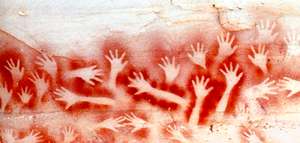
The genocidal practices perpetrated against Australian Aborigines were the outcome of policies adopted and implemented by all Australian governments from British settlement in 1788 until the present. A people who had virtually no contact with the outside world, were suddenly confronted with a hostile and alien force. Aborigines were forced out of their traditional homes, hunted like wild animals, poisoned or shot, and confined to the harshest and most desolate climes. The effect of British settlement upon these people led to near extinction within 120 years.
Even though no official figures exist, estimates of the Aboriginal population in 1788 range between 250,000 and 750,000. By 1911 the number was 31,000. Aborigines have only been included in the National Census since 1971. In 1996 the National Census recorded that 352,970 or 1.97 of the population were of Aboriginal and Torres Strait Islander descent.
Despite the substantial increase in the population of Aborigines since 1911, the conditions of life in which they find themselves remain impoverished and highly oppressive. Diseases, such as coronary disease, cancer, diabetes, and respiratory infections, are far more prevalent than 30 years earlier. Life expectancy is 50-55 years for males, approximately 55 years for females. The likelihood of an Aborigine being unemployed is far greater—22.7 percent as opposed to 8.1 percent. Fewer Aborigines own their homes. For Aborigines fortunate enough to have employment, their income is 25 percent less on average. Large proportions of Aborigines languish in prisons (14 percent of the prison population in 1997) and police watch-houses. This excludes those confined, through economic necessity, to black settlements, like Cherbourg or Yarrabah in Queensland.
The oppressed condition of Aborigines is marked in other ways—a prevalence of personal violence, lack of care for children, increased death from non-natural causes, as well as high levels of alcohol and drug abuse. It should come as no surprise that one manifestation of oppression—alcohol and drug abuse—is commonly offered as the explanation for all manifestations of oppression.

The genocidal practices perpetrated against Australian Aborigines were the outcome of policies adopted and implemented by all Australian governments from British settlement in 1788 until the present. A people who had virtually no contact with the outside world, were suddenly confronted with a hostile and alien force. Aborigines were forced out of their traditional homes, hunted like wild animals, poisoned or shot, and confined to the harshest and most desolate climes. The effect of British settlement upon these people led to near extinction within 120 years.
Even though no official figures exist, estimates of the Aboriginal population in 1788 range between 250,000 and 750,000. By 1911 the number was 31,000. Aborigines have only been included in the National Census since 1971. In 1996 the National Census recorded that 352,970 or 1.97 of the population were of Aboriginal and Torres Strait Islander descent.
Despite the substantial increase in the population of Aborigines since 1911, the conditions of life in which they find themselves remain impoverished and highly oppressive. Diseases, such as coronary disease, cancer, diabetes, and respiratory infections, are far more prevalent than 30 years earlier. Life expectancy is 50-55 years for males, approximately 55 years for females. The likelihood of an Aborigine being unemployed is far greater—22.7 percent as opposed to 8.1 percent. Fewer Aborigines own their homes. For Aborigines fortunate enough to have employment, their income is 25 percent less on average. Large proportions of Aborigines languish in prisons (14 percent of the prison population in 1997) and police watch-houses. This excludes those confined, through economic necessity, to black settlements, like Cherbourg or Yarrabah in Queensland.
The oppressed condition of Aborigines is marked in other ways—a prevalence of personal violence, lack of care for children, increased death from non-natural causes, as well as high levels of alcohol and drug abuse. It should come as no surprise that one manifestation of oppression—alcohol and drug abuse—is commonly offered as the explanation for all manifestations of oppression.
Thursday, July 27, 2006
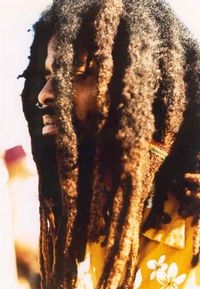
Mzunguras!
Mambo vipi?
Fists meet to join our hearts
No meat, no booze
All right
I’m searching for the holy one
Emperor Haile Selassie I
Jah Ras Tafari
Have you seen him?
Nah blaza, you got a light?
To show our way
From black to white
We are on the path
To chant down Babylon
To shake our dreads to da Reggae music
Deep into the night
Go with love and peace
Just beep me once ya done
I’m waitin for the holy one
Jah Bless
Rasta, or the Rastafari movement, is a religious movement that accepts Haile Selassie I, the former emperor of Ethiopia, as Jah (the Rasta name for God incarnate, from a shortened form of Jehovah found in Psalms 68:4 in the King James Version of the Bible), and part of the Holy Trinity as the messiah promised to return in the Bible. The name Rastafari comes from Ras (Duke or Chief) Tafari Makonnen, the pre-coronation name of Haile Selassie I. The movement emerged in Jamaica among working-class and peasant black people in the early 1930s, arising from an interpretation of Biblical prophecy partly based on Selassie's status as the only African monarch of a fully independent state, and his titles of King of Kings, Lord of Lords, and Conquering Lion of Judah (Rev. 5:5). Other factors leading to its rise include the sacred use of Cannabis, Afrocentric social and political aspirations, including teachings of Jamaican publicist and organiser Marcus Garvey (also often regarded as a prophet), whose political and cultural vision helped inspire a new world view. The movement is sometimes called "Rastafarianism" by non Rastas although some Rastas themselves regard that term as improper and offensive.
The Rastafari movement has spread throughout much of the world, largely through interest generated through reggae music—most notably, that of Jamaican-born singer/songwriter Bob Marley. By 2000, there were more than one million Rastafari faithful worldwide. About five to ten percent of Jamaicans identify themselves as Rastafari. Many Rastafarians follow an ital diet which essentailly means living by the dietary Laws of Leviticus and Deuteronomy in the Old Testament.
Subscribe to:
Comments (Atom)
